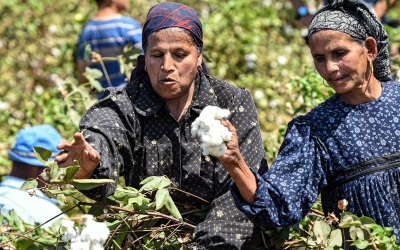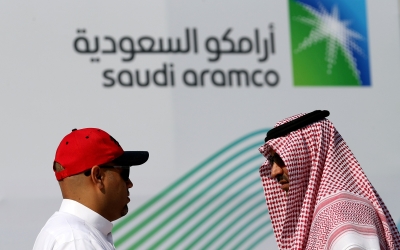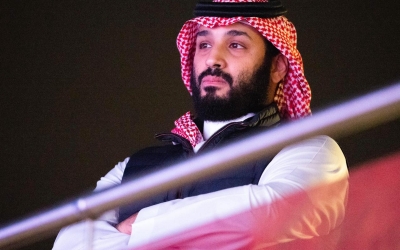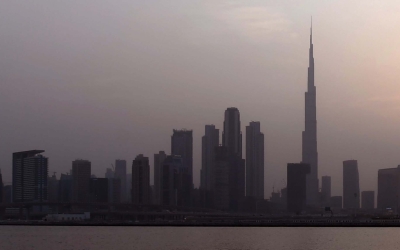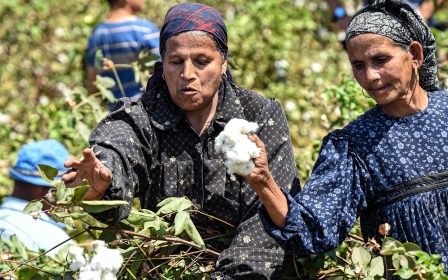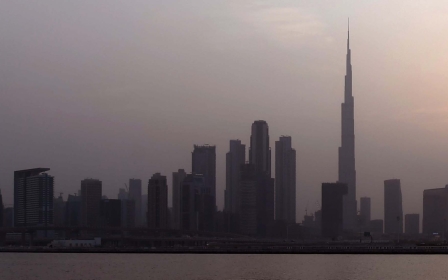'Dangerous crossroads': Gulf rulers in peril as economic shocks continue
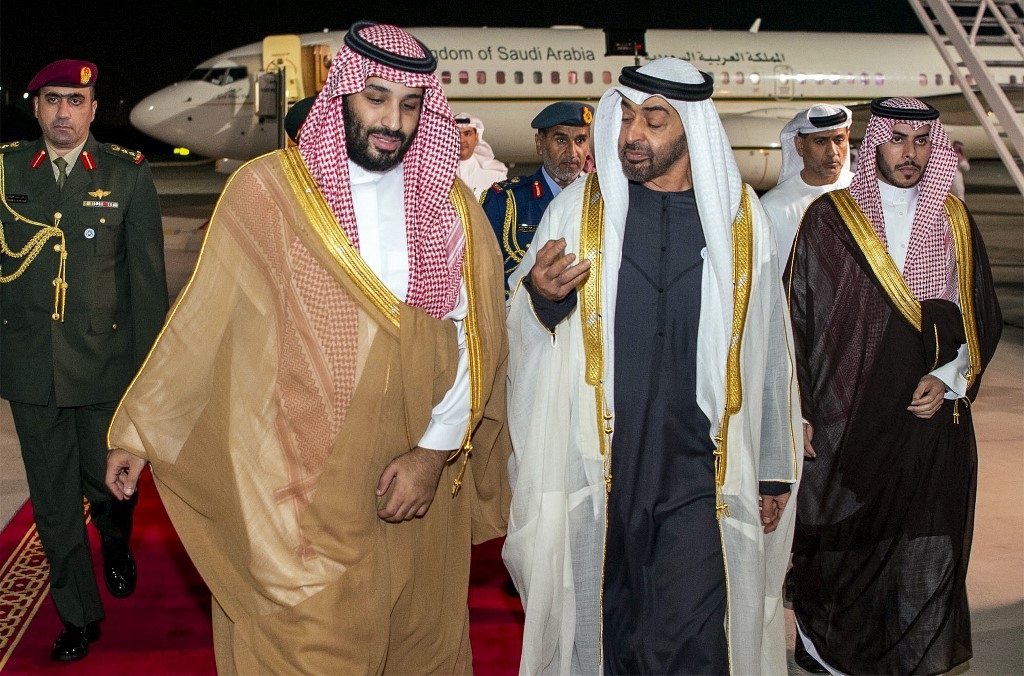
Nearly two months ago, before the global spread of the coronavirus, Riyadh made a bold gambit to slash oil prices.
The Saudis knew it was going to hit their bottom line – their break-even oil price to balance the budget – but they did not foresee such a dramatic slump in demand as the global economy ground to a halt.
Economists described the impact on Middle Eastern economies as a “dual shock”.
Last week, West Texas Intermediate (WTI) oil, the US benchmark for the commodity, entered negative price territory for the first time in history, economically impacting Gulf oil producers yet again, albeit in a lesser, but third shock.
“When it became clear how bad the pandemic was, they [the Saudis] expected it to go from bad to worse, but it went from worse to terrible as they didn’t see last week’s move,” Mike Lynch, from US consultancy Seer Energy, told Middle East Eye.
With storage supply in the United States nearing capacity, and demand for oil down globally by 9.3 million barrels per day (bpd) in 2020, the futures markets panicked and prices of WTI dropped below zero for May.
Brent crude, the dominant price indicator, also dropped, while the price of oil for the Opec countries’ 14 types of crude also spiralled downwards.
“It is a new kind of shock, that is unprecedented," Kate Dourian, regional manager for Middle East and Gulf States at the World Energy Council, told MEE.
"Some Gulf countries are better placed than others, but it’s hard to say how anyone can get over this. Look at Saudi Arabia, the war in Yemen, and the business they will lose. It’s a mess.”
'Storage tanks full'
Saudi Arabia’s move in March upped the kingdom’s production to 13 million bpd.
Under an agreement hashed out in early April between global oil producers, the price was supposed to stabilise, and Riyadh agreed to lower production by 3.3 million bpd to prevent the market being flooded with cheap oil, and keep US shale oil producers, which require a higher price per barrel to be competitive, in business.
The new situation has resulted in land storage being filled to the gunnels around the world – India is at 95 percent capacity – while oil tankers that were destined for scrapyards are being hauled back into service as storage vessels.
“Unless the global economy recovers quickly, you are going to have storage tanks full and people will stop taking oil, and if you don’t have guaranteed customers, producers will lose out," said Lynch.
"If no one wants the oil, it will have to be shut in.”
Capping, or closing, oil wells, and uncapping them, is not an overly complicated process for most Gulf oil producers, with crude easily accessible – a prime reason for a third of the world’s oil being produced in the region.
“Saudi Arabia and Iraq have the cheapest oil around,” said Lynch.
Oil fields commercially unviable
Saudi Arabia is still extracting oil from five colossal fields that have been in operation for around 70 years.
However, as demand for oil has risen over the past two decades, and technology has improved, hard to access oil was able to be extracted from old, as well as unconventional, oil fields through enhanced oil-recovery techniques.
The further price drop will make such fields commercially unviable, impacting producers across the region that have scrambled to extract as much oil as they can to earn much-needed export dollars.
Oil infrastructure projects are consequently being cancelled or put on ice throughout the Gulf, while international oil companies are reviewing their operations with an eye to downscale.
“You have companies like [Italy’s] ENI looking at their exposure in the Middle East, and people are pulling out of Iraq," said Dourian.
"Yet there still needs to be certain production, and there is a certain cost to maintaining fields.”
There is also the risk of coronavirus lockdowns preventing oil workers from conducting work at fields, refineries and associated infrastructure, on top of the risk that workers come down with the virus.
In Mozambique, two-thirds of the country’s confirmed coronavirus cases are at the French company Total’s $23bn natural gas project.
“The industry requires hundreds or thousands of people in one place, there are logistical issues, and health considerations of staff not able to work. You are going to have some delays,” said Dourian.
Saudis blamed
The drop in oil demand is expected to slash profits for the global energy sector by 60 percent.
Saudi Arabia is in a particularly tricky position, being blamed for the instability in the oil markets following its March move.
“The Saudis miscalculated in thinking they wouldn’t get blamed for crashing oil prices, even though in part that’s due to the drop in demand," Kristian Ulrichsen, a Baker Institute fellow for the Middle East at Rice University in the US. "They are an easy political target.”
The blame may ultimately lie with Saudi Crown Prince Mohammed bin Salman, the de facto ruler of the kingdom.
Energy Minister Prince Abdulaziz bin Salman admitted in a recent interview that his older half brother, the crown prince, was behind the oil production cut.
“The person who came up with this idea was my boss, Prince Mohammed,” he said.
The economic fallout for Saudi Arabia and its diversification plans could also fall on bin Salman's shoulders.
“[The crown prince] will be judged by whether he makes Saudis lives better off economically as he staked his credibility as a transformative leader, promising that by 2030 life will improve,” said Ulrichsen.
'Alarming for the region'
The creation of jobs for the Gulf’s large young population is essential, and possible only through diversifying away from a reliance on the public sector, which is funded by oil revenues.
In Kuwait, 78 percent of nationals work for the state, and in Saudi Arabia 57 percent, according to the Arab Gulf States Institute.
“You’re already seeing the Saudis cutting their expenses, raising debt, and reining in spending at possibly the worse time, as fiscal stimulus is needed to support their people," said Dourian.
"If they expect the private sector to pick up the slack in job creation rather than the state, it is bad news.”
Gulf economies had been floundering before the corovavirus crisis, with the International Monetary Fund (IMF) warning in a February report that the region’s net wealth could turn negative in less than 14 years.
“The IMF report said that at $20 a barrel, by 2027 the Gulf would become poor, so just seven years from now!" Laury Haytayan, an oil and gas expert at the Natural Resource Governance Institute, told MEE.
"Even if oil prices go up to $30, it’s alarming for the region.”
Glimpse of the future
The IMF attributed the troubling future outlook to the weak implementation of diversification strategies, which Vision 2030, the Saudi crown prince's plans to make the kingdom less reliant on oil, were expected to address.
However, the policies, while coming far too late, have also focused on sectors that have been heavily impacted by the coronavirus crisis, such as tourism, as well as heavy industry and petrochemicals.
'The coronavirus is like a projection of the future for oil-producing countries, as people are talking of oil demand peaking, environmental concerns and climate change, and it doesn’t look good for the Middle East'
- Laury Haytayan, NRGI
The report also noted the region’s drop in fortunes due to the expected rise in renewable energy and reductions in demand for plastics, issues very much on the radar today.
“The coronavirus is like a projection of the future for oil-producing countries, as people are talking of oil demand peaking, environmental concerns and climate change, and it doesn’t look good for the Middle East. It is a slap in the producers’ faces,” said Haytayan.
Saudi Arabia, however, has ploughed ahead with investments in hydrocarbon related entities.
In April, the Public Investment Fund (PIF) invested $1bn in four European oil companies while also buying a stake in the Carnival cruise liner company – cruise ships use heavy fuel oil, with one ship emitting the same amount of pollution in a day as one million cars.
“The PIF is essentially a personal tool of the crown prince, and he has already shifted a lot of funds out of government structures to this vehicle," Eckart Woertz, director of the GIGA Institute of Middle East Studies, at the University of Hamburg.
"All this money has gone to quite risky investments that have not paid out. I’m not sure it’s the time to buy cruise ship operators.”
Doomsday scenario
With the length of the coronavirus lockdowns unknown, and economists amending their forecasts on almost a weekly basis, the Gulf states are going to have to borrow money to stay afloat.
Saudi Arabia announced it may borrow $58bn this year from the international markets, its biggest debt programme since 2016. Qatar has raised $10bn and Abu Dhabi $7bn.
As Gulf states tighten their belts, military expenditure has also been impacted, with the war in Yemen having cost Saudi Arabia some $5bn a month.
“To what extent does this explain Saudi Arabia wanting a ceasefire, with the war costing billions of dollars a month? They are trying to reallocate resources that are now more urgent,” said Ulrichsen.
The triple economic shock to the region may force Gulf rulers to step up to the plate.
“The region is at a dangerous crossroads," said Haytayan.
"There is either a doomsday scenario, with the region plunged again into violence and crackdowns on dissidents, or governments act as real, accountable governments that save their countries, and don’t act like fathers taking care of their kids.”
Middle East Eye delivers independent and unrivalled coverage and analysis of the Middle East, North Africa and beyond. To learn more about republishing this content and the associated fees, please fill out this form. More about MEE can be found here.


